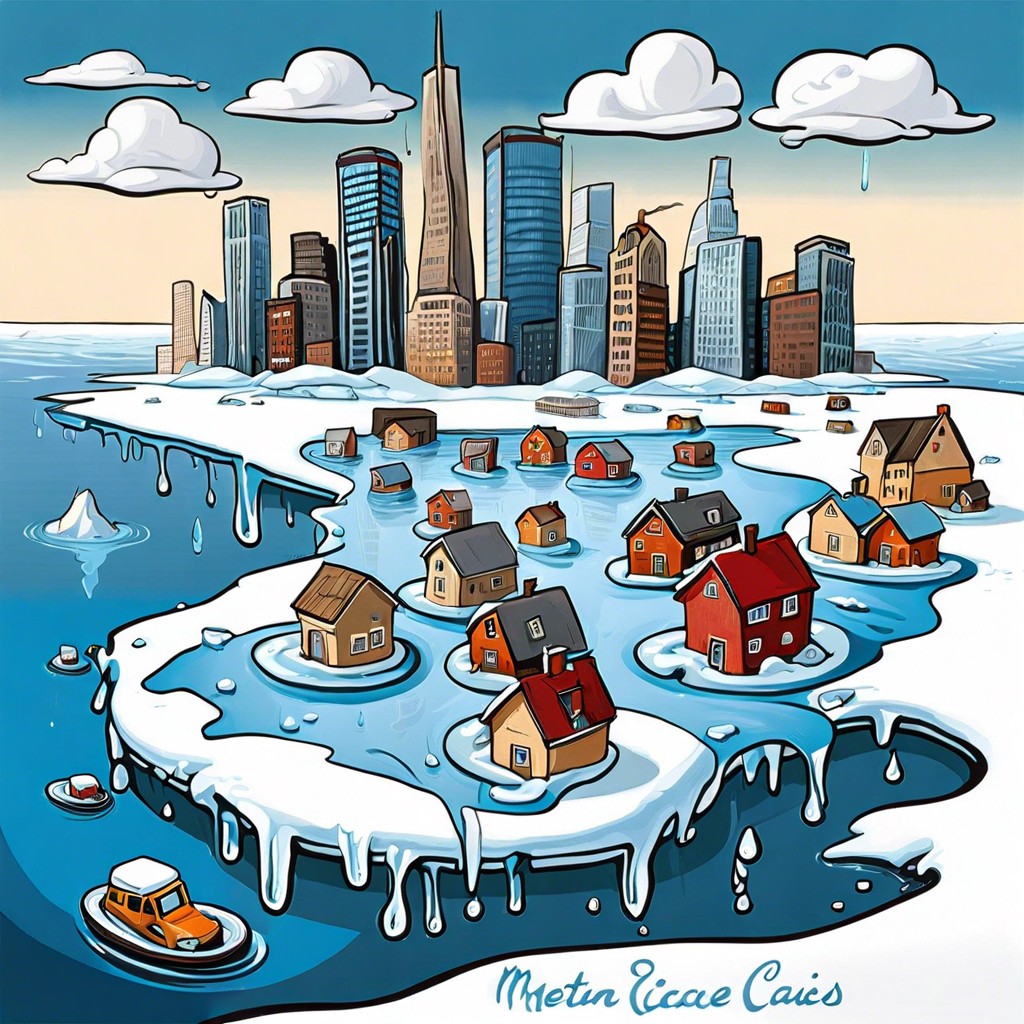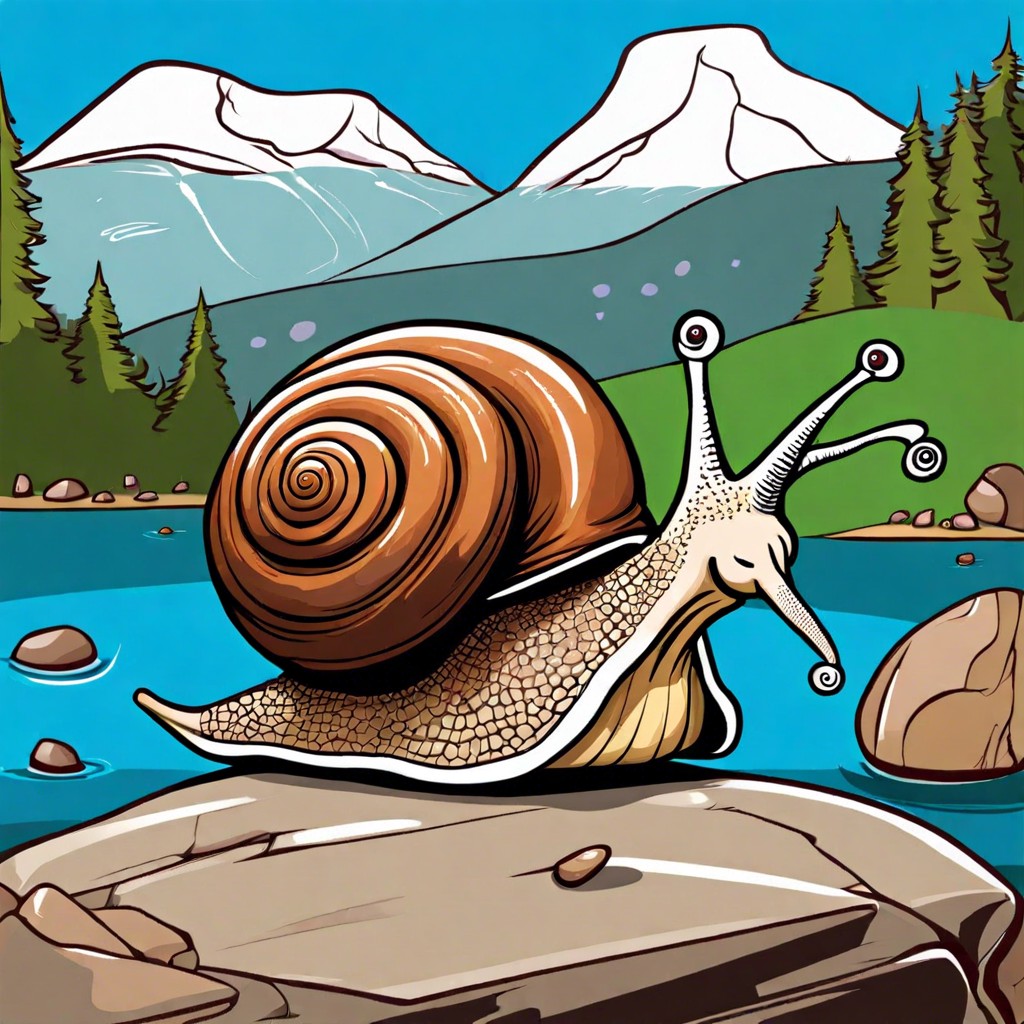Learn how the melting of the ice caps could impact sea levels, climates, and daily life in this informative article.
Imagine waking up one day to find Miami with a new Venice-inspired lifestyle. Sounds romantic until you realize gondolas can’t really replace cars. If the ice caps melted, the world would face a literal sea of troubles. We’re diving deep into how rising tides could swallow coastal cities, create fish-themed chaos in marine ecosystems, turbocharge your weather app, and reconfigure economies like a child’s Lego set. Hold on to your sunscreen, because things are about to get splashy!
Key takeaways:
- Up to 230 feet sea level rise expected.
- Coastal cities face mass evacuations and infrastructure chaos.
- Marine ecosystems experience population declines and habitat loss.
- Erratic weather includes supercharged storms and unseasonable temperatures.
- Economic turmoil hits tourism, agriculture, and insurance sectors.
Global Sea Level Rise

Picture this: You’ve finally built your dream beach house. It’s perfect. Every morning, you wake up to the sound of waves crashing and seagulls squawking their annoying but somewhat comforting calls. But hold on to your surfboard; things are about to get… wet.
With the ice caps melted, sea levels could rise by up to 230 feet. Yes, feet! That’s like Empire State Building levels of extra water. Goodbye, Maldives. Hello, Atlantis 2.0.
New York, Miami, Tokyo, and other coastal cities would need to invest in some serious scuba gear. Think Waterworld, but with less Kevin Costner.
Not only does this mean more water in all the wrong places, but salty seawater could infiltrate freshwater systems. Ever tried brushing your teeth with saltwater? It’s like gargling a beach.
And beaches? Forget about them. They’d be underwater real estate. So, let’s cherish our sandy shores while we can.
The moral of the story: Maybe all those “save the ice caps” campaigns were onto something.
Impact On Coastal Cities
Miami would get a new nickname: Waterworld, but without the cool Kevin Costner vibes. Coastal cities could find themselves swimming in a sea of problems. Literally.
First off, real estate market? Kaput. Imagine owning a beachfront home, only now your beach is miles inland. Suddenly, waterfront properties mean something very different.
Infrastructure would take a huge hit. Roads would morph into rivers, subways into Atlantis, and skyscrapers would become fancy buoyant tombstones. Bridges? More like diving boards.
Utilities wouldn’t escape either. Power grids, sewage systems, drinking water sources—all chucked into the deep end. Imagine trying to cook dinner with no power while treading water. Water parks would lose their novelty, that’s for sure.
And let’s not forget about the human element. Cities would need mass evacuations, leading to overcrowded inland areas. The phrase “packing your bags” really hits home when you’re racing against rising tides.
Disruption of Marine Ecosystems
They say when it rains, it pours. When ice caps melt, it’s an underwater apocalypse for marine ecosystems. First off, let’s chat about fish. Poor Nemo’s real estate options? Shrinking faster than my patience at a DMV. Fish species used to cold waters would struggle to adapt, leading to population declines or extinctions.
Next up, coral reefs. These glorious underwater cities would face an existential crisis. Warmer waters cause coral bleaching, turning vibrant reefs into ghost towns. And let’s not forget the ocean currents. They’d be thrown so out of whack, it’d make your head spin. Essential nutrient flows disrupted, marine food chains go haywire, and the next thing you know, sharks are crashing plankton parties. It’s chaos out there.
Also, melting ice releases fresh water into the salty sea, diluting the salinity. A bit like adding water to your overpriced gourmet coffee – it’s just not the same! This affects everything from tiny plankton to giant whales. Swimming in that freshened water doesn’t pack the same punch as the good old salty mix they’re used to.
In short, melting ice caps would send a ripple – or perhaps a tsunami – of changes throughout marine ecosystems. Fish out of water? More like fish out of options.
Changes in Weather Patterns
Imagine Mother Nature on a caffeine binge—erratic, unpredictable, and, let’s face it, slightly terrifying. That’s your weather post-ice-cap meltdown. Here’s why.
First, without all that reflective ice, more heat is absorbed by the dark ocean water, acting like a giant solar panel gone rogue.
Storms? Nastier than your morning traffic jam. Warmer waters supercharge hurricanes, giving “rainy days” a whole new, soggy meaning.
Throw in jet stream chaos, and you’ve got seasons playing musical chairs. Snow in July? Why not! Better keep both flip-flops and snow boots handy.
Speaking of seasons, expect longer, more intense heatwaves. Your A/C unit just became your new BFF. And winters, when they show up, may be either no-shows or unexpected party crashers.
Best get comfortable with unpredictability, because the weather forecast might as well be written in hieroglyphics.
Economic Consequences
Consider the economic whirlpool awaiting us. Tourism? Say goodbye to coastal resorts. Imagine Venice without its charming streets, replaced with a full-blown underwater experience. Cancun might need to rebrand as Atlantis.
Fishing industries would flounder. Ecosystem shifts could lead to species migration or extinction. No salmon for dinner, just more air-fried cauliflower.
Insurance companies would face Armageddon. Imagine the chaos of insuring properties in permanently flooded areas. Home insurance will skyrocket faster than the Sea of Galilee left open in the Dead Sea! Oh, and don’t forget the astronomical reconstruction costs.
Agricultural regions could dry up or become swim-up. Changing weather patterns would disrupt crop cycles. Expect bananas in Antarctica and snowplows in Brazil.
Energy sectors too. Hydroelectric plants facing water shortages, oil rigs battered by erratic storms. Madness.
Brace yourself, future economies could be a wild ride on a water theme park gone rogue.




